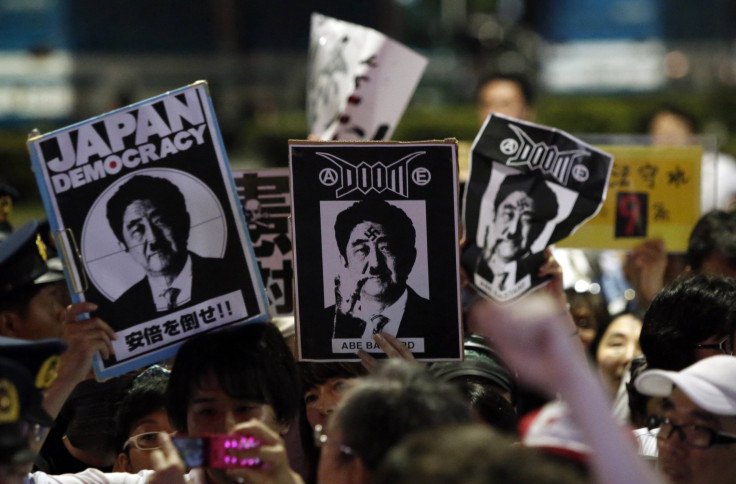Japan Overturns Ban On Military Fighting Overseas, And The Chinese Aren't Happy

Japan’s Cabinet Tuesday overturned the long-standing ban, introduced after World War II, on its military fighting abroad or alongside allies. The policy change has riled China, which still frequently invokes Tokyo's brutal aggression against China in the 1930s and '40s.
The move by the hawkish Prime Minister Shinzo Abe will let Japanese military forces help allies like the United States and Australia if needed. But at home, Abe has many critics who fear Japan will be dragged into faraway conflicts like those in Afghanistan or Iraq.
Abe quelled some worries in a press conference, insisting that Japan’s “peaceful existence” was his priority.
“There is a misunderstanding that Japan will be involved in a war in an effort to defend a foreign country, but this is out of the question,” Abe said. “It will be strictly a defensive measure to defend our people. We will not resort to the use of force in order to defend foreign forces.”
But Beijing is not convinced that the move is purely for national security, claiming it undermines peace in the region.
“China opposes the Japanese fabricating the China threat to promote its domestic political agenda,” Foreign Ministry spokeswoman Hong Lei said in a Beijing press conference. “We demand that Japan respect the reasonable security concerns of its Asian neighbors and prudently handle the relevant matter.”
Conversation online among bloggers was similarly worried about what this means for Sino-Japanese relations, as the two nations become increasingly aggressive in their claims over the resource-rich Senkaku/Diaoyu Islands in the East China Sea.
“Japan’s Abe needs to step down his military aggression; otherwise there will be war,” one Chinese blogger wrote of the Cabinet decision. “You don’t have the support of your own people. Can’t you see this is dangerous.”
“Over decades of your ban, we [in China] have been arming ourselves, do not threaten us,” one particularly belligerent blogger wrote.
Playing devil’s advocate, other bloggers noted that much of Japan probably agrees with Abe. “It’s a democracy, so we can hear the voice of Abe’s opposition, but I guarantee you military supporters are happy with this decision,” one blogger posted in the discussion, adding, “the Japanese may not want to fight in Afghanistan, but they will fight against China.”
Others hope it won’t ever come to that.
“The history can’t be ignored, but we are at a point when we don’t have to meet on a battlefield,” a blogger posted, who suggested that “diplomacy can help if we stop being distracted by flexing muscles.”
© Copyright IBTimes 2024. All rights reserved.












